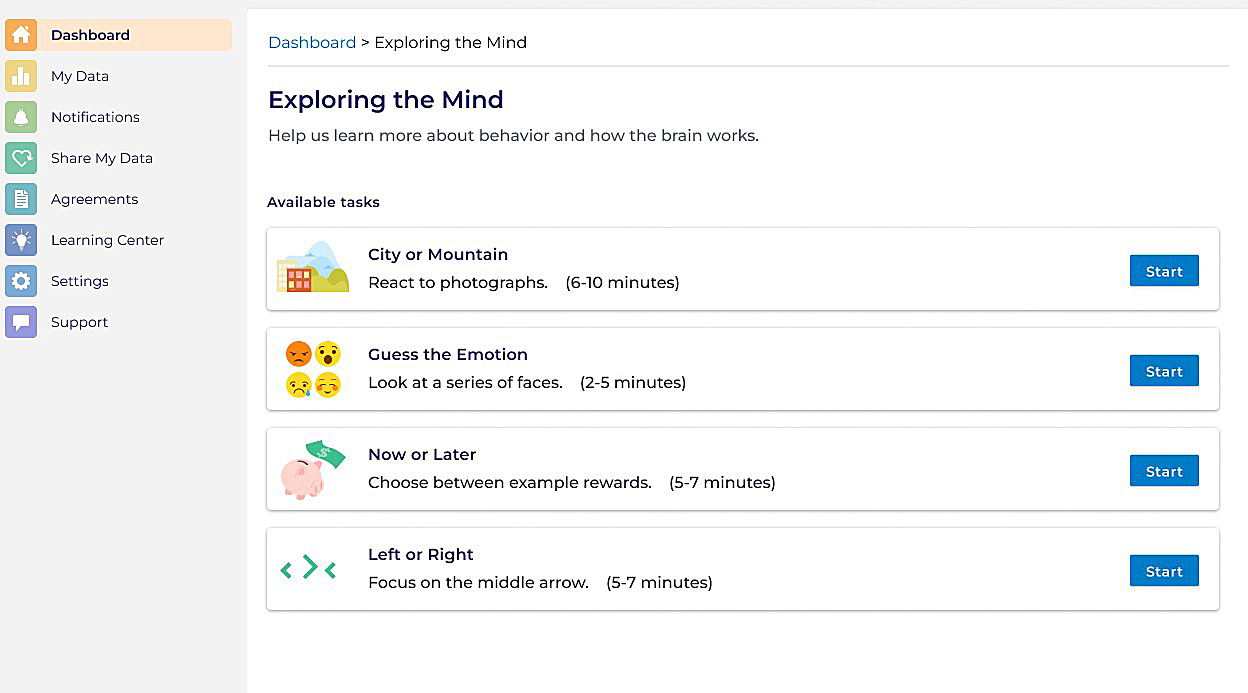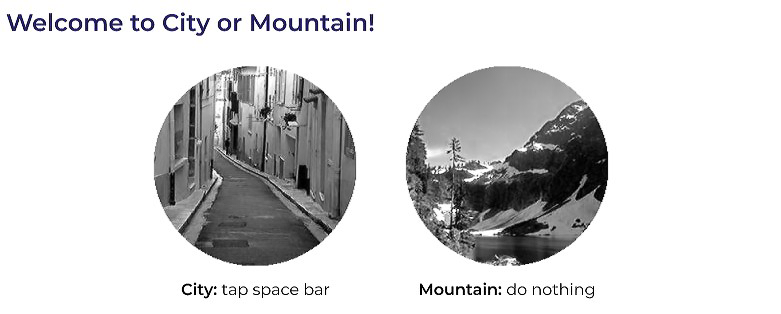
• Institute Replace
The Nationwide Institute of Psychological Well being (NIMH) and the non-profit group The Many Brains Undertaking partnered with the Nationwide Institutes of Well being (NIH) All of Us Analysis Program to adapt a sequence of recent game-like duties that at the moment are a part of the All of Us Analysis Program’s participant expertise. The quizzes, puzzles, and different participating workout routines measure talents like consideration span, decision-making, and emotion recognition.
The All of Us Analysis Program
The All of Us Analysis Program is a large-scale effort spearheaded by NIH to gather and research knowledge from at the very least a million individuals in america. Individuals who take part in this system are requested to finish surveys on completely different subjects, share knowledge from their digital well being data, full on-line duties, and supply organic samples (similar to saliva).
Why did NIMH associate with All of Us?
In 2009, NIMH developed the Analysis Area Standards Initiative, often called RDoC. RDoC was created as a brand new manner of conceptualizing and finding out psychological problems. On this framework, psychological problems are studied by means of the lens of various practical processes, similar to cognition, temper, social interactions, and so forth, with traits that exist on a continuum starting from typical to excessive.
NIMH is involved in amassing knowledge on among the elements which can be a part of the RDoC framework, similar to cognition, social, and reward processes, from a big, various pool of contributors—simply the kind of participant cohort being constructed by means of All of Us. As a bonus, All of Us gathers plenty of different psychological and bodily well being knowledge. When mixed with the data discovered from the brand new gamified duties, these knowledge might assist researchers perceive what results in psychological problems, how they develop, and the simplest methods to deal with them.

In 2016, RDoC workers convened a workgroup to determine behavioral checks that would measure elements within the RDoC framework. After inspecting the listing of checks, RDoC workers selected a number of with robust normative knowledge—baseline scores or measurements in opposition to which new scores might be in contrast. RDoC workers then issued a number of year-long contracts to completely different teams, asking them to rework the checks into easy-to-use gamified duties that had been nonetheless legitimate for measuring the meant ideas.
4 duties—Guess the Emotion, Left or Proper, Metropolis or Mountain, and Now or Later—had been finally tailored to be a part of the All of Us Analysis Program. These 4 duties had been created as a part of the nonprofit TestMyBrain platform , supported by The Many Brains Undertaking.
What are the brand new duties, and what do they measure?
NIMH labored with All of Us to introduce 4 completely different duties to their platform: Guess the Emotion, Left or Proper, Metropolis or Mountain, and Now or Later.
- Guess the Emotion: The Guess the Emotion job asks contributors to have a look at photos of individuals and identify the individuals’s feelings based mostly on their facial expressions. This job is a model of the Face Emotion Identification job, which is used to find out about social processes, social communication, and the way individuals obtain info communicated by means of facial expressions.
- Left or Proper: The Left or Proper job measures how effectively individuals can focus inside distracting environments. The duty begins with a display screen exhibiting 5 arrows—one heart arrow between two units of aspect arrows. The 5 arrows change route through the job, and the participant should point out the route of solely the center arrow. This may be difficult as a result of the aspect arrows would possibly level in a distinct route than the center arrow. This job is a model of the Flanker job, which measures consideration and response inhibition, or the power to cease a response that outcomes from inappropriate info (on this case, the aspect arrows).

- Metropolis or Mountain: The Metropolis or Mountain job checks how briskly contributors reply—or how effectively contributors resist responding—to a altering scene. Through the job, metropolis or mountain scenes fade out and in. Contributors are requested to press a response key solely once they see a picture of a metropolis. This job is a kind of gradual onset steady efficiency job. It’s used to know cognitive methods similar to consideration, cognitive management, and the power to answer just one sort of knowledge whereas ignoring others.
- Now or Later: Within the Now or Later job, contributors are offered with completely different fake situations the place they’re supplied a sure sum of money after particular ready occasions. The sum of money and ready time change in every state of affairs. In essence, contributors resolve whether or not they want a smaller financial reward in a short while body or a bigger financial reward in an extended timeframe. This can be a delay discounting job, which measures an individual’s particular person stage of temporal discounting or how lengthy they’re prepared to attend for a sure reward. This info helps researchers perceive how individuals assess the worth of rewards.
All these duties measure elements of conduct that may differ from individual to individual. For instance, some individuals might shortly determine the emotion in a face, whereas others could also be slower. Some individuals might really feel higher about receiving a bigger reward, even when they need to wait, whereas others might even see the extra fast reward as extra worthwhile. Psychological problems can affect these behaviors in several methods. Understanding how these behaviors change with psychological well being gives insights into how psychological problems have an effect on the mind. It might additionally inform interventions or remedies in order that they’ve essentially the most profit for sufferers.
How will the data from these duties be used?
All the info collected as a part of the All of Us Analysis Program, together with info collected utilizing these new duties, will probably be made obtainable sooner or later for researchers to research. The huge dimension of the All of Us dataset and the numerous forms of info collected by means of this system—genetic, bodily, psychological well being, and so forth.—enable researchers to make new connections between these well being elements and increase our understanding of how they work collectively in well being and sickness. Researchers can go to ResearchAllofUs.org to be taught extra or register to make use of the All of Us dataset.
Participation in All of Us is free and open to anybody 18 or older. Individuals can be taught extra about becoming a member of the All of Us Analysis Program at JoinAllofUs.org .